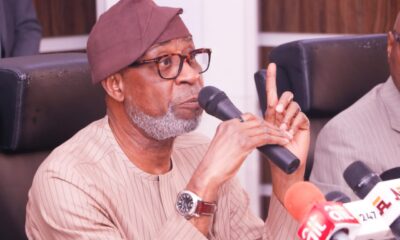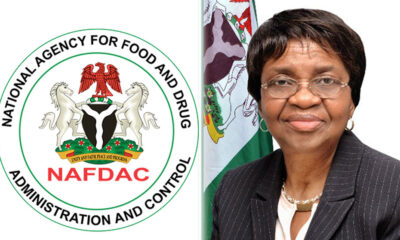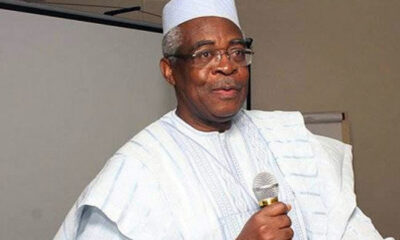Opinion
Jimi Solanke, Wasiu Ayinde and the cartoon called Nigeria

Jimi Solanke, Wasiu Ayinde and the cartoon called Nigeria
Tunde Odesola
(Published in The PUNCH, on Friday, February 16, 2024)
Aníkúlápó is the man who bears death in a pouch, not Jimi Solanke. Solanke knew a braggadocious name couldn’t stop death. So, when death came calling, Solanke followed it without fear. But Solanke wasn’t afraid of death, he was afraid of life – this he told me many years ago at the backstage of the Oduduwa Hall, Obafemi Awolowo Univerity, Ile Ife, when I sneaked up on him.
It is true, time is a virus that corrupts memory. Despite its limitation, however, memory remains nature’s hard disk embedded in the skull of every mortal. And, when I bolted from the Oduduwa Hall congregation – in pursuit of Solanke – to the backstage, I never knew my inquisitiveness would someday memorialise his memory.
I can’t remember the particulars of the event that was held in the architectural wonder called Oduduwa Hall many, many years ago. But I remember Baba Agba, as Uncle Jimi Solanke was popularly called, being the moderator of the event. As his baritone soaked the hall in honey, my mind journeyed down memory lane, marvelling at the lanky enigma before the audience – the great Jimi Solanke – world-class storyteller, actor, folklorist, singer, playwright, poet, dancer, guitarist, drummer, cultural aficionado and compere extraordinaire!
“Tunde, you must interview this wizard,” I told myself. So, I bided my time, looking for a break. My lucky break came when the session went on a break, and Baba Agba sauntered backstage. I sneaked away from my reporter colleagues, melted into the shuffling crowd, and went after him.
“Good morning, sir!” “Good morning, my dear,” he replied, the glint in his eyes was welcoming. Wow!! I couldn’t believe I was talking live with Mr Voice himself. My heart raced like a rabbit in a park. “My name is Tunde Odesola; I’m from PUNCH newspapers,” I identified myself. “Oh, PUNCH, that’s my paper,” he said. “Thank you, sir,” I gushed. “It’s a dream come true talking to you, sir.” He eyed me with his big eyes.
I didn’t bring out my tape recorder yet because I didn’t want him to see me as a bother. I continued, “I thought you came out to smoke, sir” “Oh, no! I quit smoking,” he said in his rich voice. “You quit? Why? Health reasons?” I fired a threesome.
“I’ll tell you the short story. Someone died in my family and relatives converged in my house to discuss the burial. I stepped out to smoke. When I stepped back into the house, it was as if I carried faeces with me into the house. Everyone turned their noses up, looking at me as though I was a strange object. I felt embarrassed. That wasn’t the first time I would step into a gathering after smoking a cigarette, and people would feel uneasy. To make people not feel awkward by my smoking, I decided to stop. They say smokers are liable to die young, I’m no longer young, 70 is around the corner,” he said with a grin.
No matter the manner of death that kills the elderly, his cranium won’t vanish; kò sí ikú tí yíò pa àgbàlagbà, tí a ò ní bá poolo orí è. This proverb means no matter the situation, the elderly must speak the truth at all times, without fear. Solanke exemplified the letters and spirit of this proverb through his art.
READ ALSO:
- Why we’ll continue to approve more universities – NUC
- Kano Censorship Board revokes licenses of Kannywood, Amart entertainment
- I’ll leave in summer, Mbappe tells PSG directors
There, at the backstage of Oduduwa Hall, Solanke wasn’t afraid of telling me the truth about his struggles with smoking, he wasn’t afraid of facing the challenge too. Solanke is the citizen Nigeria desires but does not deserve.
The same thing cannot be said of Fuji music maestro, Alhaji Wasiu Ayinde, aka K1 De Ultimate. Wasiu is far beneath the league of Solanke and his kindred, Tunji Oyelana. Wasiu is the citizen Nigeria desirously deserves – tribalistic, selfish, ignorantly endowed and materialistic. The Nigerian citizen epitomised by Wasiu sees music as a means to a cash-and-carry end and not a selfless tool for social change.
In the heat of the economic hardship suffered by Nigerians during the Olusegun Obasanjo presidency, Wasiu, in 2006, lifted his voice up to God, singing unto Him to eclipse Obasanjo, “Ba wa mu baba kuro..” But Wasiu’s tongue appeared super-glued to his palate and his ears stuffed with palm oil wool when the herdsman, General Muhammadu Buhari, misruled the country for 8 years as he didn’t give Buhari, who’s the worst Nigerian leader ever, the same treatment he gave Obasanjo.
Wasiu has kept a deafening silence since the economy further nosedived after his tin god, President Bola Tinubu, assumed power in 2023. In societies emancipated from mental slavery, Wasiu’s action would’ve been met with a backlash that would affect his musical image and fortunes, but Nigeria is Babel, where the Toad’s croaking is music to the ears.
Did Solanke love children? No. He worshipped them. He dedicated his life of storytelling to them. In his programme, Story Land, Solanke would dance like a five-year-old, giggle like a preteen on his first excursion, and yet pass across his teachings with the charm of sage. Oh, how I love him!
Solanke saw the wicked world through the innocent eyes of the child and armed himself with a paddle strong enough to steer his canoe, singing on his earthly journey his songs of wisdom that include Baba Agba, Onile Gogoro, Eje ka jo, Jenrokan, Na Today You Come, among others.
Since he travelled to America after graduating from the Theatre Arts Department of the University of Ibadan in 1969, before his eventual return to Nigeria in 1986, Solanke produced many albums such as In the Beginning, Ase, Orin Orisa, Storyteller, America Has Got Magic, Multiplicity of Praise, Hidden Gold, Once Upon a Time, among others. Gesamtkunstwerk is a German word that means total art. Solanke was a Total Man, who practised Total Art, giving his totality to his art.
That was why Solanke, the voice of the narrator in the Nollywood blockbuster, Jagunjagun, was ever happy, contented and respectable. That was why he was never a servant at Bourdillon. However, this is not to say Wasiu has no class at all. Wasiu has his own class and remains a savant of Fuji, with great hits under his belt. But when compared with Solanke, shoe get size.
READ ALSO:
- Missing lady: Police arrest prophet, 6 other ritualists for killing lady to make N200m in 7 days
- Dollar hits N1,600 at parallel market
- Manchester United join race to sign Osimhen
At this juncture, I want to wear the Solankean robe and see the world through the eyes of a friend’s 11-year-old child. ’Busola Durojaiye was a younger colleague in the pen-pushing profession. She distinguished herself at the Osun State Broadcasting Corporation, Osogbo, in the early 2000. She has a good grasp of the sociopolitical and economic situation of Nigeria, making her my go-to person on Nigerian gists.
Last week, our talk centred on the exorbitant prices of foods, goods and services across the country. ’Busola has a wicked sense of humour. “Ara n kan everybody ni Nigeria o, everybody is touchy. Everybody is sick. Even ‘your’ daughter (name withheld) is sick,” she said. “Ha, kilo se, what’s she sick of,” I asked, worried.
“On Saturday, her boarding school housemistress called, saying Angel (not her real name) was sick with fever. The housemistress said she had been taken to the hospital for a Widal Test, whose result was being expected. I told the housemistress to give the phone to Angel,” ’Busola explained.
“When Angel came online, she said she had a high fever. Orí mi kó kó fò lo ná; I was alarmed. High fever ke? Angel said she wasn’t the only one having a high fever in the school. She said about 12 students were affected, including two of her close friends, Dab and OmoT (real names withheld). Then, in a conspiratorial tone, she said, ‘The doctor and nurse said I have no blood at all’.
“I asked her if the doctor and the nurse told the housemistress about her having no blood at all. She said no. She said the doctor and the nurse confided in her only. Angel then told me she knew the remedy to her acute blood shortage. She listed the remedy to include malt drink, ice cream and jollof rice from a particular restaurant. I told her it was blood that she needed, but she said ice cream, malt drink and jollof rice produce better blood. She said students, including her two friends, whose parents had sent money for the cure, were already getting well.
Mother sent N11,000 to daughter’s housemistress for the cure of blood shortage. When mom called the next day, Angel’s voice was clearer. “How are you feeling now, Angel?” mother asked. “Blood is returning to my body now,” she said. “How did you know blood is returning to your body,” mother queried. “I can feel it in my system,” daughter answered.
Solanke understood the ways of children. He must have loved cartoons, too. Nigeria is a huge cartoon; a cruel, unfunny joke, yoking the storyteller and his audience. At 63, Nigeria remains a child, its spine cracked by corruption, nepotism and evil leadership.
When will blood return to the veins and arteries of Nigeria? When, I ask?
Email: tundeodes2003@yahoo.com
Facebook: @Tunde Odesola
X: @Tunde_Odesola
Jimi Solanke, Wasiu Ayinde and the cartoon called Nigeria
Opinion
Why Yahaya Bello does not represent the youth – Farooq Kperogi

Why Yahaya Bello does not represent the youth – Farooq Kperogi
A persistent but entirely illogical and factually inaccurate response to my column on former Kogi State governor Yahaya Bello revolves around the notion that his terrible record as a governor somehow delegitimizes youth participation in government and undermines the “Not Too Young to Run” bill.
First of all, Yahaya Bello became a governor at 41 in 2016. There’s no country in the world where 41 is regarded as “youth.” He is a full-grown adult.
The UN defines youth as people between the ages of 15 and 24. In the United States, it’s between 15 and 24 years. In the European Union and the United Kingdom, it encompasses individuals aged 15 to 25.
The Commonwealth limits it to the ages of 15 through 29. But the African Youth Charter, which has perhaps the most elastic definitional compass of youth in the world, defines it as “any individual between 15-35 years of age.”
The Nigerian National Youth Policy obviously derives inspirational strength for its conception of youth from the African Youth Charter because it also officially refers to people between the ages of 18 and 35 as belonging to the “youth.”
This is all a giant irony, of course. Nigeria, which has an average life expectancy of 55 years, regards 35 years as “youth” (which means, on average, Nigerians spend only 20 years as “adults”) while industrialized societies with higher average life expectancies (it’s 77 for the United States and 81 for the European Union) have a lower age threshold for youth.
It’s even worse in the general Nigerian population, which regards a 48-year-old man (who has already lived more than half of his life) as a “youth” and uses his indiscretions, ineptitude, infantilism, and larceny as justifications to shut out young people from governance.
Yahaha Bello didn’t need the “Not Too Young to Run” legislation to be a governor. The minimum age required to be a governor in the 1999 constitution—before the “Not Too Young to Run” bill was signed into law on May 31, 2018—was and still is 35. The bill did not change the age requirement for governorship positions.
READ ALSO:
- Judicial Reform: NBA seeks removal of CJN as head of NJC
- Why I’m not ashamed doing menial jobs in US — Doris Simeon
- Tinubu names Jim Ovia chairman of student loan fund
That was why we had many people who were elected governors in their 30s in 1999. For example, Ibrahim Saminu Turaki was elected governor of Jigawa State at the age of 36. Donald Duke was 38 years old when he was elected governor of Cross River State in 1999. Orji Uzor Kalu of Abia was 39. Ahmad Sani Yerima of Zamfara was 39. Enugu State’s Chimaroke Nnamani was 39.
With a few exceptions, the rest of the governors in 1999 were in their 40s (Delta State’s James Ibori was exactly 40), which is consistent with Yahaya Bello’s age. Why didn’t critics of youth participation in government invoke the failures of much younger governors than Bello at the incipience of the Fourth Republic to delegitimize “youth” participation in government?
The obsession with the youth of people in government in Nigeria is particularly strange because we have had Yakubu Gowon, a then 31-year-old unmarried man, as Head of State. Olusegun Obasanjo was 38 when he first became the head of state. Muhammadu Buhari and Thomas Aguiyi-Ironsi were 41. IBB was 44.
In fact, most of the early leaders we venerate today were elected/appointed into their positions when they were in the same age group as Yahaya Bello. For example, Sir Ahmadu Bello assumed office as the Premier of the Northern Region on October 1, 1954, at the age of 44.
Chief Obafemi Awolowo became the Premier of the Western Region in 1952 at the age of 44. Sir Abubakar Tafawa Balewa was 47/48 when he became the Prime Minister of Nigeria in 1960. Murtala Muhammed was only 36 when he became the Head of State of Nigeria on July 29, 1975.
The examples are legion, but the point is that there is nothing unusual about someone of Yahaya Bello’s age being a governor. That’s why I find the focus on his age both ignorant and ahistorical.
Of course, more than anything, all that this points to is that people who got into government in their 30s and 40s two or three decades ago are still in power or hanging around the corridors of power, which leaves only a little space for new entrants from that age bracket.
So, the few people in their 30s and 40s who make it to the circles of political power in contemporary Nigeria come across as novel, as marvels of young people in government, and as generational curiosities whose missteps are exteriorized to all people within their age range who are outside the orbit of power and who might want to get into it.
That’s unfair. Just like the incompetence, callousness, and venality of older politicians shouldn’t be used against all older people, Yahaya Bello’s villainy and corruption should not be used against people in his age bracket— or younger.
This attitude implies that had Yahaya Bello been a geriatric fuddy-duddy, and not a 48-year-old man, he would not have been the debauched, profligate thug that he is, which is absolute flapdoodle.
Age has no effect on integrity and probity. It is defeatist and evinces low self-worth for young people to beat themselves up because a 48-year-old man who became a governor at 41 turned out to be a rotten, incurable crook who pillaged his state without the slightest tinge of compunction and then installed a slavish, empty-headed puppet as his successor.
READ ALSO:
- Yahaya Bello: Court summons EFCC chair over contempt
- Nollywood veteran actor, Ogunjimi is dead
- Soldier dies while ‘rushing to rescue brother arrested by policemen’
It’s mostly young people—in the peculiar way Nigerians understand young people—who are saying Yahaya Bello’s spectacular incompetence and depravity symbolize the failure of “youth” in governance and that the older generation is justified in its reluctance to share power with young people.
In other words, if a few “youths” in government mess up, all youth should take the blame for it, accept that the failure of one of them is the failure of all of them, and then step back for the older order to continue to misrule exclusively.
Notice that no one, certainly no older person I know of, says older people shouldn’t be allowed to govern because they’ve been messing up all these years. Only the “youth” are delegitimized on account of their age when they mess up. That is reverse ageism, that is, the idea that only old age, not youth or knowledge, should confer authority or respect on people.
We are more than our ages. We embody a totality of multiple influences. The fact that Yahaya Bello was a grasping, primitive bandit in government doesn’t mean every 41-year-old who becomes a governor will be like him. That’s ridiculously reductionist.
In any case, youth or old age are not permanent states. They are in perpetual flux. It is yesterday’s youth that become today’s older people.
Nigeria is one of the world’s youngest countries with a median age of 16. Yet, when we look at the corridors of power, the vibrancy of youth is conspicuously absent. This gap between our young population and their representation in governance is not just a gap in numbers, but a gap in fresh ideas, innovation, and the spirit of our nation.
Yahaya Bello did not fail because he was young. He failed because he never prepared to succeed, and that wasn’t a function of his “youth.” Donald Duke was the second youngest governor in 1999, and he is credited with making tremendous marks in governing Cross River State.
Yes, age and experience have their place. But so does youth. An Igbo proverb, after all, says “If a child washes his hands, he could eat with Kings.”
Farooq Kperogi is a renowned Nigerian newspaper columnist and United States-based professor of journalism
Opinion
Farooq Kperogi: Yahaya Bello’s EFCC comeuppance

Farooq Kperogi: Yahaya Bello’s EFCC comeuppance
I am not from Kogi State, but I have strong opinions on former Kogi State governor Yahaya Bello—as most Nigerians do. There is no doubt that few politicians in Nigeria are as universally reviled and despised as Yahaya Bello because of how he turned governance into a violent infant play, denuded it of even the faintest pretense to sanity and respectability, and developed an uncanny capacity to incite raw rage in people.
That’s why there is mass excitement in Nigeria over his current travails with the Economic and Financial Crimes Commission. Most people see his fate as a richly deserved karmic retribution for his eight years of incompetent, anger-arousing, profligate, and terroristic governance in Kogi State, the consequences of which transcended the bounds of Kogi State.
He began his tenure as governor as the symbol of hope for youth inclusion in governance. But he soon became a byword for recklessness, malfeasance, ineptitude, incivility, and the greatest betrayer of the youth constituency. He shouldn’t have been governor—or, for that matter, anything in politics.
He had no guardrails on his tongue. Like a spoiled, over-indulged, ill-bred, and uninhibited child, he blabbered whatever inanities caught his febrile fantasies with no care for consequences. He ridiculed civil servants, and terrorized opponents with full-strength viciousness— as if he would remain the governor of his state forever.
He even nicknamed himself—or was nicknamed by his flunkies—as the “white lion.” But when the EFCC came calling, the “white lion” transmogrified into a pitifully frightened, yellow-bellied chicken. Now the white-lion-turned-chicken is fluttering and hiding like he has gone insane.
READ ALSO:
- BREAKING: Tension as anti-riot police forces take over Benue APC secretariat
- Liverpool crash out of Europa as Ademola Lookman’s Atalanta win 3-1 agg
- Europa: Martinez two penalty saves power Aston Villa into S’final
A wanted notice has been issued for him by the EFCC, the Inspector General of Police has withdrawn all police officers assigned to guard him, and the Nigerian Immigration Service has placed him on its watchlist. I can’t wait to see him brought to justice for all the crimes he committed while he held sway as the governor of Kogi State.
In a 2022 article, I described him as an ignorant, incorrigibly petulant child who was trapped in an adult’s body, who was destroying the littlest semblance of decency left in government in Kogi State, and who thought he could democratize his infantilism nationwide by seeking to be president.
According to several Kogi State civil servants, Bello didn’t pay full salaries for most civil servants for most of his tenure as governor, yet he is being hunted by the EFCC for allegedly laundering up to 80.2 billion naira, presumably the money he should have used to pay the salaries of workers.
In less than one week after he was sworn in as Kogi State governor on January 27, 2016, according to a May 13, 2016, Premium Times’ investigation, Bello approved N250 million naira for himself as “security vote” and another N148 million to “furnish” and “renovate” his office. At that time, Kogi State workers hadn’t been paid their salaries for months.
Bello’s spokesman at the time said the raiding of the state’s treasury in the name of security was justified because Kogi had become the seedbed of crime as a result of its location.
“It is public knowledge that Kogi State has been contending with serious security breach for the past 10 years,” he said. “As a result of the location of the state as gateway to many states of the federation, the state drifted into a criminal hotbed. Also, years of gross maladministration and blinding embezzlement has left the youth bare, exposing them to all sorts of criminal activities to survive. Kogi became a haven of robbers and kidnappers.”
That was the start, which most people ignored. Everything went downhill from there. The man didn’t even pretend to govern.
In 2020 when COVID-19 raged and most people were caught in a complex web of uncertainties and anxieties about the new infectious disease, Bello chose to become a abhorrent, ignorant conspiracist and the conduit for all sorts of wild, crazed, dangerous, fringe chatter about the disease.
READ ALSO:
- Bobrisky, Cubana Chief Priest and Indabosky Bahose
- Damagum to continue as PDP national chairman until August – NEC
- Reversing electricity tariff hike will cost us N3.2 trillion in subsidy payments – FG
Yet, although he openly questioned the existence of COVID-19, he fed fat on it like the vampire that he is. The Premium Times of March 26, 2021, reported that Bello spent 90 million naira in 2020 to purchase COVID-19-tracking software that cost only 30 million naira.
“The software, approved by a COVID-19 sceptic, Governor Yahaya Bello, was for tracking coronavirus cases in the state,” Premium Times reported. “However, the software is no longer functioning as the developers said they had a contract to host it for only one year.”
It’s impossible to chronicle Bello’s in-your-face financial malfeasance in a newspaper column. Not even a book-length narrative is sufficient to do justice to how much Bello financially bled and sucked the blood of Kogi State.
The man’s daring electoral terrorism is another issue that has earned him well-deserved loathing in Nigeria. This is a man who commanded his toadies to dig deep ditches on roads (that were built with billions of naira) just to stop voters from a part of the state he knew won’t vote for his candidate from being able to cast their votes.
According to Senator Natasha Akpoti-Uduaghan, at the time the senatorial candidate of the Peoples Democratic Party (PDP) for Kogi central, “We woke up this morning to the news that Yahaya Bello has instructed the excavation of all access roads to my hometown. My hometown is cut off from Obangede community; it is also cut off from Eika. And right now, I am in front of another road which was just excavated, thereby cutting me out of travelling out of my hometown.
“What this means is INEC would not be able to [access] certain communities, especially my hometown. What this also means is if Yahaya Bello and his APC goons decide to attack me and the good people of Kogi central in Ihima community, it will be impossible for the DPO to get across to this place. That means I, Natasha Akpoti-Uduaghan, my fellow candidates, and supporters are trapped. We have no way out because Yahaya Bello has dug gullies.”
This is a vile and detestable vermin who should never have been allowed to get anywhere close to governance, much less be a governor. He is an excellent specimen of how not to be a governor—or, in fact, a human. I have not the littlest drop of sympathy for him.
Given the peculiarities of the Nigerian political environment, it seems likely that he is in trouble with the EFCC only because he has fallen out of favor with the president or his henchmen. I honestly don’t care.
More than anything, though, Bello’s troubles exemplify the transience of power and the imperative for humility when you wield it.
Farooq Kperogi is a renowned Nigerian newspaper columnist and United States-based Professor of Journalism.
Farooq Kperogi: Yahaya Bello’s EFCC comeuppance
Opinion
Bobrisky, Cubana Chief Priest and Indabosky Bahose

Bobrisky, Cubana Chief Priest and Indabosky Bahose
Tunde Odesola
(Published in The PUNCH, on Friday, April 19, 2024)
Abido Shaker! Life is a widening gyre where women fear cockroaches, cockroaches fear cocks, cocks fear men, and men fear women. A few years ago, Chukwemeka Cyril Ohanaemere was an ordinary name in Nigeria until fakery kissed bombast and vainglory took materialism to bed, birthing ‘The Lion Himself’, ‘The War’. ‘The Fight’, ‘Dabus Kabash’, ‘The Indabosky Bahose’.
Ohanaemere, the unlettered Anambra indigene, more famous for his comic displays than his cleric claims, also calls himself ‘The Liquid Metal’, which is another name for mercury. Ohanaemere aka Odumeje doesn’t call himself ‘The Liquid Metal’ because he understands that mercury is the only metal that is liquid at room temperature. He calls himself ‘The Liquid Metal’ because of the fancy the name carries.
In a viral video, 41-year-old Odumeje boasted to some fans about his numerous spiritual powers that he hasn’t used yet, saying, “…Indabosky Bahose is power, Lebadusi Prelamande is power, Abido Shaker is power, Dabus Kabash is power, Lipase Parrel is power, Gandukah Gandusah is power; those powers, I have not touched them, I’ve never used them, I’m still on Indabosky Bahose!” All na wash (in Nyesome Wike’s voice)
Odumeje’s gung-ho powers are like the sands of the beach. When angry, he can make people go deaf and dumb because he’s the ‘Warlord’, which he pronounces as ‘Worrod’. In 2022, however, when the men of the Anambra State Environmental Task Force pulled down his illegal church in Onitsha, the all-conquering God that Odumeje serves refused to rescue him. Odumeje’s God was probably snoring when the officials of the environmental task force rained slaps on him and kicked him around like a graven image.
Because of their unique adaptability nature, the female gender deserves the ‘Liquid Metal’ title much more than the jester of Onitsha. But the female gender shouldn’t undermine their flexibility and overlook a worrisome development that the case of popular cross-dresser, Idris Olanrewaju Okuneye, presents.
READ ALSO:
- Damagum to continue as PDP national chairman until August – NEC
- Reversing electricity tariff hike will cost us N3.2 trillion in subsidy payments – FG
- Bandits gun down 23 villagers in Kaduna community
Ever since Okuneye aka Bobrisky confessed before a Federal High Court in Lagos, to possessing a cock, the calm in the women’s rights community nationwide has been disturbing.
By his confession, it’s not out of place to imply that Bobrisky had seen the nakedness of women in public restrooms. In this light, I had expected Nigerian women’s rights advocacy groups to test the (in)elasticity of our laws by pressing against Bobrisky charges such as invasion capable of causing breach of law and order, intrusion of privacy, and potential sexual threat against children and women, among others. Or, how else can you explain the dangers posed when a man in a woman’s clothing uses the same restroom with unsuspecting females?
In the US, a man or woman who wishes to change their sex must first live the gender they want to change to for a year before undergoing sex-change surgery. They must also undergo a series of psychological and psychotherapy care before they can change their gender. This is to test their resolve.
Both Odumeje and Bobrisky are the creations of a society whose gaping vacuum for icons has been filled by Mammon-seeking pranksters. They are the products of a crippling economy and morally shattered nation unfurling as Paradise Lost. This is why you see the millions of Nigerians seeking guidance from yeyebrities, who themselves are lacking-thought broken spirits.
Many see the prosecution and conviction of Bobrisky for naira mutilation as scapegoating, coupled with the ongoing prosecution of a former shoemaker, Pascal Okechukwukwu aka Cubana Chief Priest, for the same offence. The position of people who hold this belief can’t be impeached because scapegoating, according to Merriam-Webster Dictionary, is ‘a goat upon whose head are symbolically placed the sins of the people after which he is sent into the wilderness…’. This is the same reason why the Yoruba say the fellow on whose head the community coconut is broken won’t wait to partake in it, ‘eniti won fi ori re fo agbon, ko ni duro je ni be’.
It was former President Goodluck Jonathan who defined the lack of shoes as an index of poverty. I don’t know whether to categorise shoemaking as a mirror reflecting poverty or affluence. But a background search describes Odumeje as a hustler who ‘had his humble days as a struggling leather designer on the streets of buzzing and busy Onitsha City in Anambra State’. I’m not unaware that the dazzle in razzmatazz can polish a shoemaker into a leather designer on the streets of Onitsha. Cubana Chief Priest wasn’t ashamed to reveal life on the streets of Aba, Abia State, as a shoemaker.
READ ALSO:
- Netizens knock Tinubu aide, Onanuga, over comment on Yahaya Bello arrest
- Boy, 19, nabbed for raping 9-year-old girl in Kwara
- 16 killed as Borno bus runs over ISWAP explosives
Valid questions are being raised as to the parameters used in singling out Bobrisky and Cubana Chief Priest for prosecution when the children of former President Muhammadu Buhari and their powerful guests ‘sprayed’ and trampled on naira during the wedding of Hanan, one of Buhari’s daughters. I’ll offer free consultation here: the Economic and Financial Crimes Commission can pin the prosecution of the two citizens on their serial abuse of the naira, but for Christ’s sake, Nigerians need an explanation on why a musician like Wasiu Ayinde, who was garlanded by an Ogun State monarch, Oba Kolawole Sowemimo, with taped naira notes, is left of the EFCC hook. Sowemimi, who’s the Olu of Owode, was suspended by the Ogun State Council of Traditional Rulers but Wasiu was not even questioned by the EFCC for his consistent abuse of the naira. Is it because Ayinde is the bard of the ruling All Progressives Congress? For the integrity of its brand, the EFCC should explain lest the crackdown be seen as a witch-hunt.
Instead of picking on Bobrisky for naira abuse, numerous online videos of Bobrisky showing Bobrisky claiming to be a woman and having boyfriends abound. Her nickname name, ‘Mummy of Lagos’, points at homosexual allegations trailing her. In an online video, Bobrisky said, “If you dump me, na another man go kari me. Do you get what I’m saying? If you dump me, if you think you’re done with me, na another man wey dey cherish me, wey wan nack me, go kari me.”
On account of this video alone, and in the light of his confession before a court, to being a man, Bobrisky is guilty of the anti-homosexual laws of the country. Also, the EFCC should know the dangers inherent in leaving Bobrisky’s five million online followers, mostly youths, to manipulation and indoctrination.
If Nigeria had laws against homosexuality, the country should man up to defend the laws and stop hiding behind the naira-spraying fingers of Bobrisky – US position on homosexuality notwithstanding. Nigeria and the US both need each other. The ‘not guilty’ plea of Cubana Chief Priest is expected to expand the frontiers of the laws against naira abuse, and I wait to see how the case unfolds. C-o-u-r-t!
Email: tundeodes2003@yahoo.com
Facebook: @Tunde Odesola
X: @Tunde_Odesola
Bobrisky, Cubana Chief Priest and Indabosky Bahose
-

 metro2 days ago
metro2 days agoLabour Day: Nigerian workers are dedicated, resilient, says NURTW leader
-

 Auto1 day ago
Auto1 day agoAppeal court takes over NURTW case as NIC withdraws
-

 News2 days ago
News2 days agoLabour-FG face-off imminent as NLC rejects new salary increase
-
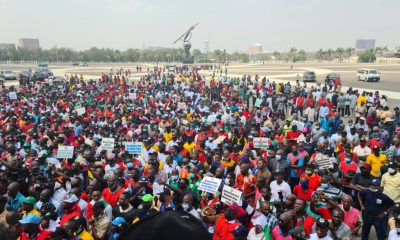
 News2 days ago
News2 days agoFG approves salary increase for civil servants, military, police
-
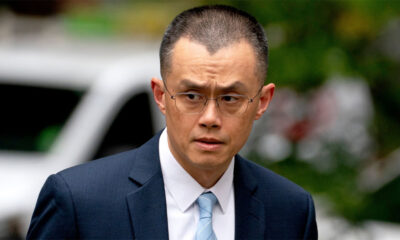
 International2 days ago
International2 days agoBinance founder bags jail term in US
-
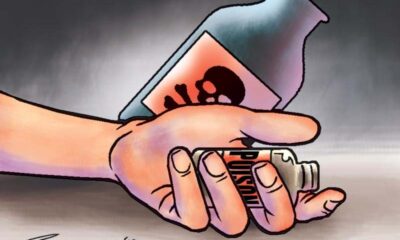
 metro3 days ago
metro3 days agoWoman arrested in Ogun after husband commits suicide
-

 metro19 hours ago
metro19 hours agoSecurity forces, vigilantes arrest kidnapper terrorising communities in Kogi
-

 News2 days ago
News2 days agoFG set to repatriate 20,000 Nigerians from Chad, Cameroon

